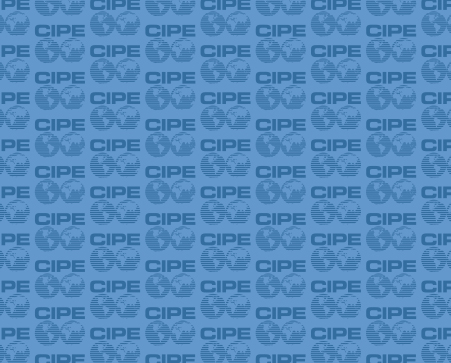
On Sunday night, CIPE partner Democracy in Development (DENDE) pulled off a victory for democracy in Paraguay that surpassed their own expectations: the first true presidential debate in the country.
Not only did all four leading presidential candidates participate, the debate was broadcast over the six principal television networks in the country, as well as on 150 commercial radio stations and more than 500 community radio stations. No debate on this scale has happened before in Paraguay, and probably not in all of Latin America.
DENDE was not alone in pulling off this event. Its principal partner in country was the Center for Regulations, Norms and Studies of Communication (CERNECO). The event has been a year and a half in the making and was preceded by series of grassroots organizing events in forums for the business, social and political sectors of the country. Through these forums and the citizen surveys that DENDE conducted, a policy framework was developed to guide the political, economic, and social priorities for the country and which helped steer the debates.
Two debates have been planned: the next one will be held on Sunday, March 24. Last Sunday’s debate covered themes such as the national budget, good governance, constitutional reform, and trade relations with the regional tade bloc Mercosur and Brazil. The upcoming debate will cover social themes such as education and the environment.
Organizing the debates has not been without challenges. Like this year’s Superbowl, electrical outages delayed the program not once but four times. Charges of sabotage are being leveled at fringe leftist groups who were not allowed to participate in the events, which were limited to the four leading contenders. The format of the debate was structured on the agreements that could be made between the different candidates to ensure their participation.
But the success of the first event far outstripped its shortcomings. No one believed the candidate furthest ahead in the polls, Horacio Cartes, would participate. It is to his credit that he risked participating, and that puts him on higher democratic ground than Mercosur colleagues such as Argentina’s Cristina Fernández who, as a candidate for reelection in 2011, declined to participate in that country’s presidential debates, despite her public statements about the importance of policy dialogue. The Paraguayan public watched last Sunday’s debate, too — a stunning 80 percent of households are estimated to have tuned in.
Paraguay has been much criticized by its neighbors for impeaching President Fernando Lugo last year, and has been barred from participating in Mercosur. However, on Sunday Paraguay outshone its neighbors in opening up the democratic process and providing Paraguayans with the opportunity to hear what each of the presidential candidates will offer the country if elected. This coming Sunday’s debate will be broadcast at 8pm local time and may also be viewed via digital streaming on the ABC TV Web site.
John Zemko is Regional Director for Latin America and the Caribbean at CIPE.
Published Date: March 20, 2013
